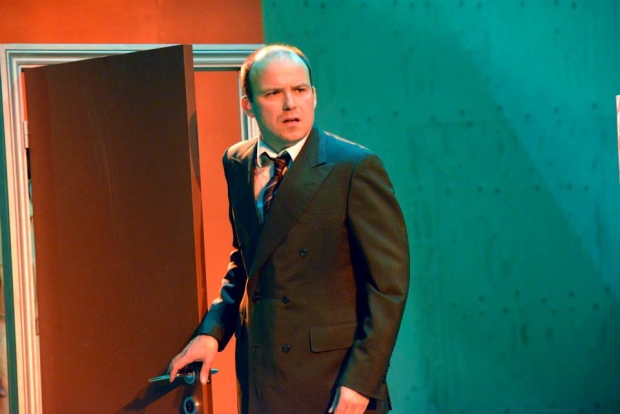
© Keith Pattison
The most disturbing thing about Franz Kafka's classic fable of the terror state is that nobody seems to be in charge. Everyone's fallen into line with the culture of corruption, surveillance and false accusation that lead Josef K to his inevitable fate.
In Nick Gill's brilliant and imaginative adaptation, directed by Richard Jones, Rory Kinnear gives a tremendous performance of someone who's made the mistake of not playing by the rules because he doesn't even know what they are. He slides down the chute, kicking and screaming, sweating and muttering, but he knows he's toast.
The most famous British stage version of the novel to date is Steven Berkoff's stylised, Expressionist sideshow (a fringe hit in 1974, revived at the National in 1991 with Antony Sher as Josef and Berkoff himself as the painter Titorelli), actors in white face, costumed in black and white, "filmed" in grey.
Jones, Kinnear and designer Miriam Buether do something different: in a banal, anodyne contemporary setting of a giant courtroom, Josef is a hopelessly humanised specimen who, on his 35th birthday (30 in Kafka), wakes up to reality with guards in trench coats in his bedroom, and piles of petitions on his desk at the bank, where he is an associate vice-president.
We, the audience, inhabit this courtroom, for the auditorium has been transformed with rows of plywood seating, built up in a combination of politburo and corrida and divided by a travelator that gives both Josef and his rushing about a sense of momentum that he cannot control. We constitute the surreal labyrinth, the fixed nightmare setting, replacing Josef's journey through the proliferating courtrooms, or the echoing cathedral.
In public, Kinnear's Josef talks perfectly "normally," like everyone else. In the privacy of his own thoughts, he speaks a sort of Joycean goobledegook until, in the escalating madness of his own office, he becomes the Stanley Unwin of the statute book, a clerical clown with a communication problem.
The other notable aspect of KInnear's performance is its tragic seam of sexual guilt, as if everything that goes wrong is a punishment for the indiscretions of youth. The opening image is of Josef in a nightclub with an explicit lap-dancer taking his money. This girl – like all the others in the play – is played by Kate O'Flynn. She is the neighbour he thinks he might love, the toilet cleaner who wants him to rescue her from the vile flogger (Marc Antolin) in the bank's vaults, and the devoted secretary who secretly adores him.
Because of this, and O'Flynn's flagrant availability in all her manifestations, you feel Josef is being victimised for his potential to love. There's an arid and spiteful air about the magistrates, the old folk (some with oxygen masks) filling in their forms, Sarah Crowden's fussing, nosy landlady (doubled with a fearsome information officer), that creates an insurmountable wall of opposition.
And when Josef's Uncle Bertie (a finical old meddler as played by Steven Beard) takes him to a top lawyer – not Kafka's sinister Huld but Sian Thomas's sleek and gassy Mrs Grace, a creature who for some reason reminds me of a repellent Manhattan socialite, or arts patron; well, she does incorporate Titorelli, too – he's assured in her endless stream of muttered guff that his best bet is not to seek out justice per se but the lower officials of a higher court.
There is a line of European literature that leads directly from Dostoevsky to Kafka, Orwell and Pinter, and Kinnear's Josef is at first surprised by the guards who invade his privacy and steal his breakfast – for no reason – just as Goldberg and McCann materialise out of the blue to grab Stanley in The Birthday Party. It's not so much Big Brother and Little Chap at the Young Vic, as the dismaying dismantling of someone's will to live, and we all feel like that – on a daily basis – when confronted with more obdurate and insensitive fellows clothed in a little brief authority.
The Trial runs at the Young Vic until 22 August. Click here for more information and to book tickets.












